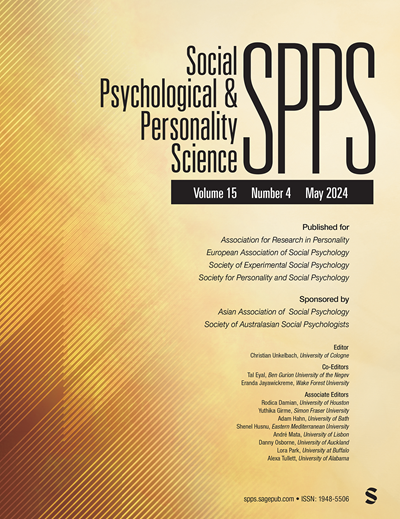Beyond Outrage: Observers Anticipate Different Behaviors From Expressors of Anger Versus Disgust
IF 3.3
2区 心理学
Q1 PSYCHOLOGY, SOCIAL
引用次数: 0
Abstract
The modern world affords unprecedented opportunities for individuals to express moral sentiments. The widespread distribution of one specific type of sentiment — outrage — has consequences for social and political harmony. The current investigation contributes to better understanding these consequences by examining what types of aggression people expect from the outraged. Furthermore, it delineates how these expectations are shaped by the emotion used to express outrage. Three pre-registered studies ( N’s = 800, 1630, 1100) revealed that people infer different types of aggression from individuals who expressed anger nonverbally compared with those who expressed disgust nonverbally. Perceptions that the outraged individual was angry corresponded with expectations of direct aggression rather than indirect aggression, whereas perceptions that the outraged individual was disgusted corresponded with expectations of indirect aggression rather than direct aggression. These results revealed that the distinct emotions used to communicate outrage shape observers’ expectations of how moral conflicts will unfold.超越愤怒:观察者从愤怒和厌恶的表达者中预测不同的行为
现代世界为个人表达道德情感提供了前所未有的机会。一种特定类型的情绪——愤怒——的广泛传播对社会和政治和谐产生了影响。目前的调查有助于更好地理解这些后果,通过研究人们对愤怒者的攻击类型的期望。此外,它还描述了这些期望是如何被用来表达愤怒的情绪所塑造的。三个预先注册的研究(N = 800,1630,1100)显示,人们从非语言表达愤怒的个体与非语言表达厌恶的个体中推断出不同类型的攻击行为。认为被激怒的个体是愤怒的与直接攻击预期相对应,而不是间接攻击预期,而认为被激怒的个体是厌恶的与间接攻击预期相对应,而不是直接攻击预期。这些结果表明,用来表达愤怒的不同情绪塑造了观察者对道德冲突将如何展开的预期。
本文章由计算机程序翻译,如有差异,请以英文原文为准。
求助全文
约1分钟内获得全文
求助全文
来源期刊

Social Psychological and Personality Science
PSYCHOLOGY, SOCIAL-
CiteScore
12.50
自引率
1.80%
发文量
77
期刊介绍:
Social Psychological and Personality Science (SPPS) is a distinctive journal in the fields of social and personality psychology that focuses on publishing brief empirical study reports, typically limited to 5000 words. The journal's mission is to disseminate research that significantly contributes to the advancement of social psychological and personality science. It welcomes submissions that introduce new theories, present empirical data, propose innovative methods, or offer a combination of these elements. SPPS also places a high value on replication studies, giving them serious consideration regardless of whether they confirm or challenge the original findings, with a particular emphasis on replications of studies initially published in SPPS. The journal is committed to a rapid review and publication process, ensuring that research can swiftly enter the scientific discourse and become an integral part of ongoing academic conversations.
 求助内容:
求助内容: 应助结果提醒方式:
应助结果提醒方式:


